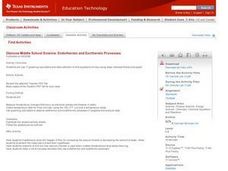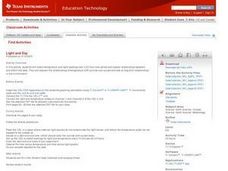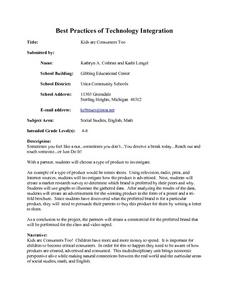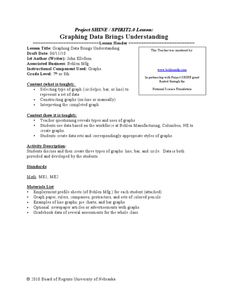Visa
The Influence of Advertising
Pupils become informed consumers and citizens with this lesson on the influence of advertising, identifying basic advertising techniques and discriminating between fact and claim in modern advertisements and commercials.
American Statistical Association
Chocolicious
To understand how biased data is misleading, learners analyze survey data and graphical representations. They use that information to design their own plans to collect information on consumer thoughts about Chocolicious cereal.
Radford University
Corn and Popcorn
Have a popping good time. Using probability and statistics skills, learners determine which type of popcorn to buy based on the percentage of kernels popped. After analyzing corn and popcorn sales to make a prediction of future sales,...
Curated OER
Nutria And The Disappearing Marsh
Young analysts examine changes in the nutria population, vegetation density, and marsh area over time in the wetlands of Louisiana. They import data and use the TI-73 Explorer to graph and analyze the effects of nutria on marsh loss.
Council for Economic Education
Sand Art Brownies
Which is better, Coke or Pepsi? Pupils analyze the concept of substitute goods as they investigate the choice to purchase alternate products for better prices. Fun and practical, the engaging shopping exercise helps savvy scholars get...
Balanced Assessment
Lotto
You can't win if you don't play! Find out how to increase your chances of winning the lottery. Scholars analyze a state lottery system for the probability of winning. They also consider different combinations of numbers and how they...
Texas Instruments
Endothermic and Exothermic Processes
Young scholars investigate temperature using the TI. In this chemistry lesson, students analyze the change in temperature, as chemicals are dissolved in water. They analyze data collected using the CBL 2.
Curated OER
Vernier EasyData App
Used along with data collection devices, the EasyData Application for the TI-83 Plus/TI-84 calculator allows learners to use real data to learn math and science. Statistics, curve fits, and integrals are used to analyze the...
Curated OER
Once Upon a Time
Young artists view pieces of artwork by Robert Harris, then have class discussions, write collaborative stories, make a painting or drawing, and analyze and create their own advertisements. This series of lessons should lead to some...
Balanced Assessment
The Contest
Good advertisers can make mathematics seem irrelevant. Teach your classes to use math to see through these tactics and make good decisions. The posed task has pupils analyze sweepstakes statistics to determine and compare the cost of...
Curated OER
The Bank Account
Your algebra learners become bankers for a day as they explore compounding interest and the formula used to calculate the balance in a savings account. Questions guide the learners as they analyze the formula's parts and their connection...
Curated OER
In and Out Function Problems
Third graders solve In and Out function problems. They analyze a chart and discuss the steps to solving the functions, and discuss the patterns and complete the charts. Students then create a book of repeating patterns using magazines,...
Curated OER
Jambalaya's Restaurant
Students use a menu and recipes to work on adding, subtracting, and percentages. They are given they weekly circulators, advertisements, or actual products and students practice figuring out sales tax. Students figure slaes tax and tip...
Curated OER
Energy Content of Foods
Learners collect data, organize and analyze the data and compare it to real life scenarios. This assignment requires two class periods.
Texas Instruments
Light and Day
Pupils explore the concept of collecting data as they collect data on their graphing calculator about time, temperature, and light. Learners plot the data and create histograms and box and whisker plots to analyze the data.
Curated OER
Getting Started with the TI-Navigator™ System: What's My Line?
Learners analyze linear functions in this algebra lesson. They explore the meaning of slope and the slope-intercept form of a line as they investigate the effect changing parameters on the graph of a linear function.
Curated OER
Domian and Range of Graphs
High schoolers determine the domain and range of various graphs using a graphing calculator. Given a set of graphs to analyze, learners calculate the range and domain of the graphs by plotting the graphs on their calculators. Downloads...
Curated OER
TI Workshop Presentation Guide for "Preparing for Proofs"
Pupils discover proofs using the TI in this geometry lesson. They collect data from newspaper and magazines and analyze their data using the TI, relating it to proofs.
Texas Instruments
What's the Scale?
Pupils will analyze scales as related to models and real life in this geometry instructional activity. They work together to compare the dimensions on a model as compared to the real building.
Curated OER
Does the Decimal Point Really Make a Difference?
Fourth graders study the decimal dilemma and discover major math mistakes in the real world with cheeseburgers advertised for .99 cents each or colas for .89 cents each.
Curated OER
Kids Are Consumers Too
Students investigate a chosen product. They use television, radio, print, and internet sources to investigate how the product is advertised. Students create a market research survey to determine which brand is preferred by their peers...
Curated OER
Mathematical Magazines
Students classify and tabulate the type of advertisements found in a collection of magazines. Determination is made on what percent of the total number of ads each type represents. They present their results orally and in a graph.
Curated OER
Samples and Stats
Young scholars explore different methods of taking surveys and conducting polls and examine these methods for bias. They design and administer a sample survey, analyze the data and present their findings to the class.
Curated OER
Graphing Data Brings Understanding
Students collect, graph and analyze data. In this statistics lesson, students use circle, pie, bar and lines to represent data. They analyze the data and make predictions bases on the scatter plots created.























